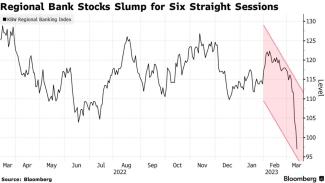
Should Rising Dividend Investors Be Worried About Their Regional Bank Stocks?
Rising Dividend Stocks – Should I Worry About the Outlook for Regional Banks?
March 14, 2023
By John H. Robinson, Financial Planner/Owner Financial Planning Hawaii and Fee-Only Planning Hawaii
In response to the failures over the past few days of Silicon Valley Bank (SVB) and Signature Bank, there has been a selloff in nearly all regional bank stocks. Financial Planning Hawaii clients who follow our strategy of investing in rising dividend stocks for passive income know that I like to include a few regional banks in broadly diversified rising dividend portfolios.
Reasons for the Sell-Off in the Regional Bank Sector
Nearly all the companies that meet our screening criteria are now trading at or near their 52-week lows. There are three primary drivers of the sell-off that has occurred over the past week. The first is a fear that there will be a run on regional banks similar to what happened at SVB. In my opinion, this is a gross overreaction. A big reason why there was a run on SVB was that 90% of its deposits were uninsured by FDIC. Most regional banks have far less uninsured deposits. Additionally, the fact that the federal government stepped in to insure ALL depositors at SVB (including uninsured deposits) should assuage the fears of the majority of depositors who are under the FDIC limits.
A second driver of the sell-off is concern that other banks may have made the same ridiculously boneheaded decision to invest consumer deposits in long-term bonds when interest rates were at historic lows that SVB’s investment management team did. The details of the shockingly misguided investment decisions made by SVB’s Board are chronicled in the following Wall Street Journal article yesterday (March 13, 2023) “CEO Greg Becker Was There for SVB’s Quick Rise and Even Quicker Fall.” As the article notes, the decision to bet the ranch on interest rates continuing to fall when rates were already at historic lows and the Federal Reserve Chairman Jerome Powell was clearly signaling the Fed’s intention to raise rates to curb inflation, is likely an outlier within the regional bank universe.
The third driver is that banks can expect to see significant deposit outflows merely as depositors respond to higher yields in brokered CDs, treasuries, and money market mutual funds. This has been happening all year and is likely to continue or even accelerate. Readers of my newsletter know that I have been encouraging clients to get their cash out of low/no-yielding bank accounts. Anecdotally speaking, we are seeing large inflows into client accounts with Schwab/TD Ameritrade from client accounts with banks and credit unions. I doubt that my experience is unique. To stem the tide of outflows, regional banks will likely need to raise the rates they pay on deposits. This may reduce the near-term profitability of regional banks.
So What Should Investors in Regional Banks Do?
I am guessing most readers know that whenever an entire sector sells off, I view the downturn as an opportunity to get healthy rising dividend companies when they are out of favor. We have done this in the past few years with pharmaceutical stocks, defense stocks, and, most recently, chipmakers. I view the sell-off in regional banks in the same vein. While I do not discount the idea that their earnings may decline for a while, most of the companies we track have below-average dividend payout ratios, high dividend safety scores from SimplySafeDividends.com (the service I use to monitor rising dividend companies), and long histories of raising dividends through challenging environments. In fact, 100% of the regional banks that currently meet our buy criteria raised their dividends through the 2007-2009 financial crisis. Since our objective is to buy and hold forever, I view the current sell-off as an opportunity to lock in attractive current yields that may be expected to rise over time at a pace that is higher than the inflation rate.
John H. Robinson is the owner/founder of Financial Planning Hawaii, Fee-Only Planning Hawaii, and Paraplanning Hawaii. He is also a co-founder of fintech software-maker Nest Egg Guru.
DISCLOSURES
Securities offered through J.W. Cole Financial, Inc. (JWC) member FINRA/SIPC. Advisory services offered through Financial Planning Hawaii and J.W. Cole Advisors, Inc. (JWCA). Financial Planning Hawaii and JWC/JWCA are unaffiliated entities
Fee-only financial planning services are provided through Financial Planning Hawaii, Inc. DBA Fee-Only Planning Hawaii, a separate state of Hawaii Registered Investment Advisory firm. Financial Planning Hawaii does not take custody of client assets nor do its advisers take discretionary authority over client accounts.
The information contained herein is general in nature. Neither Financial Planning Hawaii nor J.W. Cole provides client-specific tax or legal advice. All readers should consult with their tax and/or legal advisors for such guidance in advance of making investment or financial planning decisions with tax or legal implications

